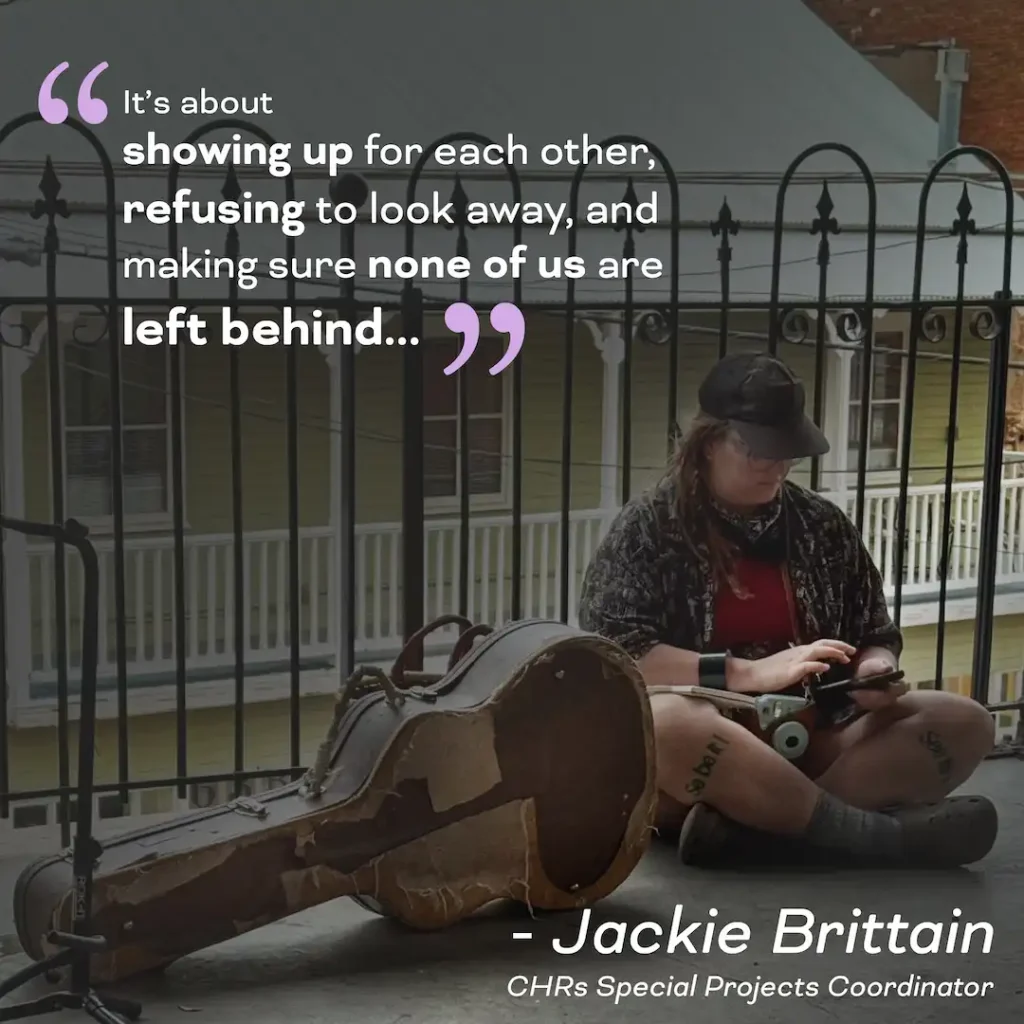Lived Wisdom, Community Heart: Spotlight on Jackie Brittain
As CHR’s Special Projects Coordinator, Jackie brings both professional acumen and her own rich, lived experience to every aspect of the work. From outreach and administrative support to hands-on harm reduction, Jackie’s approach is rooted in compassion, authenticity, and a commitment to meeting participants exactly where they are.
Jackie’s understanding of harm reduction began long before she knew the name. “When I look back on my life as a younger drug user, I was learning about and doing harm reduction a long time before I ever heard the term,” Jackie reflects. “My friends taught me survival skills—like not sharing syringes, doing test shots, keeping an eye on each other. We were just doing the best we could to keep each other safe.” For Jackie, harm reduction started as peer wisdom and community care. Years later, a simple act from her mom—offering naloxone without judgement—helped Jackie realize harm reduction could also be practiced by families and whole communities.
At CHR, Jackie wears many hats. “I am the Special Projects Coordinator, which means I’m involved in outreach, administrative support to the Peer Navigation Program, collaborating with the Arizona Harm Reduction Coalition, among other projects.” The challenges she faces are real and pressing: limited resources, persistent stigma, and the continual grief of the overdose crisis. “We are always balancing limited resources against the very real and urgent needs of our participants,” Jackie explains. “Stigma is another challenge, especially in our rural county, where there is still so much misunderstanding about drug use and harm reduction. The constant reality of overdose, loss, and grief is heavy, but it’s part of the fuel that motivates us to keep going, no matter what circumstances we find ourselves in.”
Jackie believes community support is essential. “One of the biggest is reducing stigma, and everyone can help with that. Even small acts matter, like treating PWUD with dignity and respect, or speaking up when you hear a harmful stereotype.”
Jackie first crossed paths with CHR’s founder Lu several years ago, and the connection was immediate. “I began my practicum with them in August of last year. I am now in the second year of my practicum, and a few months ago I was fortunate enough to be offered a staff position. The work CHR is doing is truly unique in our region, and I am so proud to be a part of it. I especially value that CHR centers low-barrier employment and is committed to navigating the challenges that come with it.”
For Jackie, the biggest change since joining CHR is the deepening of her own sense of belonging and growth. “I came into my role at CHR during a really difficult period in my life, and the grace, respect, and support I’ve received here have truly been life-saving.”
Harm reduction has also reshaped Jackie’s relationship with substance use. “Sobriety never felt like a goal that belonged to me, it was always something I thought I “should” want, which is probably why it never lasted. Now I’ve found a way to live now that feels good, that’s safer and more sustainable, and most importantly, I’ve found a community where I can be my authentic self without hiding any parts of me. That has been the biggest contributor to my health and personal growth.” This philosophy has become central to Jackie’s life and work, fostering empathy and a sense of liberation: “For me, harm reduction is a philosophy of liberation. It’s about creating the conditions where people can live more freely, with dignity, and without shame,”
Jackie sees the compounding impacts of criminalization and poverty as the biggest barriers faced by CHR participants. “Folks are oftentimes using all of their energy on survival, figuring out where to sleep, how to eat, how to stay physically safe. When we’re in survival mode, there isn’t much left to begin tackling other barriers. sustained support is really difficult to come by. Many available programs are short-term, have rigid rules, or are full of red tape. Our Peer Navigation program is so important, it offers sustained and person-centered support that meets people’s immediate and long term needs. Unfortunately, the reality is that the need is far greater than what we can currently provide.”
Asked to share a standout moment, Jackie highlights the daily reality of seeing participants support one another, creating survival strategies and moments of hope in the midst of adversity. If she could wave a magic wand, “housing” would be her first wish, followed by accessible, nonjudgmental healthcare. Dreaming big, “I want our participants to live in a society without criminalization or shame, with all basic needs met.”
In closing, Jackie distills the heart of harm reduction: “It’s about showing up for each other, refusing to look away, and making sure none of us are left behind. When we show up for those of us who are pushed furthest to the margins, we’re building communities where all of us have a better chance to belong and to thrive.” She extends thanks to all supporters of CHR, whose every act of solidarity sustains this vital work.
